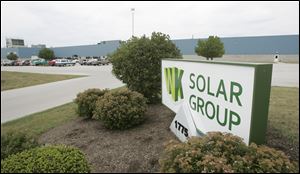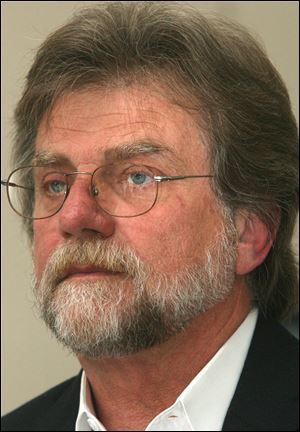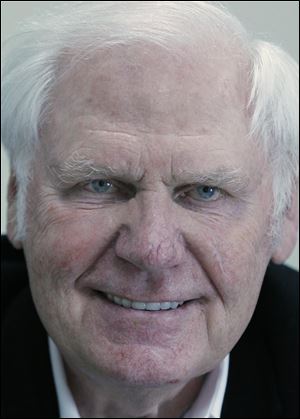
A BLADE INVESTIGATION
Execs lent to selves at solar firm
Money flow began on day local company got $5M
12/24/2012
Most employees at the Perrysburg company have been laid off.
the blade
Buy This Image

Most employees at the Perrysburg company have been laid off.
The executives of Willard & Kelsey Solar Group, a struggling solar-panel manufacturer, began lending themselves company funds the same day the firm received $5 million from a group of Italian investors, internal financial records show.
Michael Cicak, Willard & Kelsey's chairman of the board and chief executive officer, received a $40,000 loan that day. Mossie Murphy, chief financial officer at the time, received a $30,000 loan.
The loans to five company executives totaled more than $500,000 from August to October, 2008, records show. In addition, the top five executives also received payments of almost $1 million from November, 2008, through March, 2009.
The financial records obtained by The Blade detailing Willard & Kelsey's spending in its early days were maintained by William Mitchell, former Willard & Kelsey CEO.
He died at age 61 in July, 2011, of complications stemming from an illness.

The late William Mitchell, former CEO, maintained records of transactions.
An email from the firm's lawyers Friday stated that Mr. Mitchell "had been terminated as an officer and employee of Willard & Kelsey Solar Group for cause."

CEO Michael Cicak received a $40,000 loan the day investors gave the firm $5 million.
The financial records obtained by The Blade detailed Willard & Kelsey's spending before it received its first round of state money in March, 2009.

Lee Fisher, a former state lending official, says executive pay was not part of discussions.
To date, the company has received a $5 million loan and a $500,000 grant from the Ohio Department of Development and a $5 million loan from the Ohio Air Quality Development Authority.
The state might have denied Willard & Kelsey funding if it knew about the company's payments to its executives in 2008, said former Ohio Lt. Gov. Lee Fisher, who led the Department of Development from 2007 until February, 2009.
"This is the first time I've heard about this," he said. "That would have raised serious concerns in my eyes. There's no question if I had known that information, I would have had our staff do an ever deeper dive."
Generally, the state doesn't ask about executive compensation when it's vetting loan and grant candidates, Mr. Fisher said.
Willard & Kelsey has been plagued with production delays and financial issues since it moved into its Perrysburg headquarters in 2008. It laid off most of its employees in January. State documents indicate the company had about 72 employees in April, 2011.
The company's 262,000- square-foot facility was toured by high-profile Democrats including Vice President Joe Biden and former Ohio Gov. Ted Strickland in 2009 and U.S. Secretary of Labor Hilda Solis last year -- all touting the firm as a promising alternative-energy company of the future.
The Italian investors who provided the initial $5 million start-up funds did not respond to emails seeking comment.
Mr. Murphy, who now is Willard & Kelsey's vice president of development, said the company never misused state funds and always complied with state law. He said private funding is used at the discretion of the company's executives.
Mr. Murphy declined to comment on how the Italian investment money was spent, citing a legal agreement between the firm and its investors.
"There is clearly a distinction between state funds and private funds," he said. "Our private funding, I can say, exponentially is many, many times the state funding. As a private company, it would be fairly typical of a private company to use its own private funds as it sees fit in the normal course of things."
Flow of money
In March, 2009, Willard & Kelsey received its first $500,000 grant from the state.
Records show that the company spent more than $20,000 to buy Detroit Tigers tickets, pay for Pittsburgh sporting events, and purchase airline tickets for family members of executives from May through August of that year.
Company financial records also show in 2009, the firm spent $3,081 at Arhaus, a furniture store, and paid $2,112 to Global Cash Access, which provides automated teller machines to casinos.
Mr. Murphy, who spent $1,644 on a company credit card to buy plane tickets for his family, said he reimbursed the company shortly thereafter. He declined to comment on other expenses on his company credit card, including $508 spent at a Pittsburgh Penguins event and $3,601 listed under "Pittsburgh Steelers."
He said the company spent its private funds on executive expenditures and didn't use state money.
"It wasn't like I took state money and bought plane tickets with it," he said.
Mr. Cicak, the company's CEO, said he did not wish to speak with The Blade and hung up on a reporter during a phone call Wednesday. He also did not respond to a subsequent email detailing corporate expenditures and executive payouts, but the company on Friday released a statement through its lawyer, Marvin A. Robon.
"Willard & Kelsey Solar Group affirmatively states that the state programmed $5.5 million for the purchase and installation of the development finishing line, and any funds used for any purpose other than the purchase and installation of the development line were company funds and NO state monies were used for that purpose."
The statement also addressed credit-card purchases: "In both public and private companies, many times a company credit card is utilized for purchases that may or may not be eligible company expenses. Any personal expenses charged to a company credit card were reimbursed by the individual."
Gary Faykosh, listed as the chief operating officer, and James Heider, listed as the chief technological officer, did not return calls.
Jim Appold, listed as the company's president, declined to comment.
What is clear, based on a company report dated Sept. 22, 2009, among Mr. Mitchell's records is that Willard & Kelsey was struggling.
In 2009, the year after the company lent or paid more than $1.4 million to executives, the report stated the firm's goals were to install the first solar-panel production line and "to become revenue positive."
Vetting firms
State officials, past and present, said they were unaware of the loans and payments to executives. The officials didn't ask about executive compensation when they were considering loans and grants to the firm.
It's usually not a part of the conversation, said Daryl Hennessy, assistant chief of the business services division at the Department of Development.
When vetting a loan candidate, state officials review three years of financial data, a balance sheet, an income statement, and a credit history, Mr. Hennessy said. Additionally, the state typically requests a business plan and a three-year forecast from private companies, he added.
The initial executive loan payouts at Willard & Kelsey were not detailed in financial reports sent to the state in October, 2008.
The state would have discovered the company's executive compensation if it requested more specific, itemized documents, such as bank and credit card transactions. Those forms were not among the documents requested by the state, records show.
"I would honestly say it is not a normal topic for discussion when we are talking to a company what the CEO is paid or another senior executive," said Mr. Fisher, who led the Department of Development when the state approved loans and grants to Willard & Kelsey. "Part of that is because the state money is to never be used for compensation."
After Republican Gov. John Kasich took office in January, 2011, the process of awarding state loans was streamlined, said John Minor, general manager of financial services, agribusiness, and food processing at JobsOhio, created to help monitor the progress of state loan recipients.
A return on investment is now part of the factors used to identify an optimal loan candidate, Mr. Minor said. Review committees also look over applications to determine if a company is a good fit to receive state funding.
Although the process was altered and JobsOhio was established, the state still does not require bank or credit-card records when it screens candidates.
State support
In 2008, the state had cash on hand for clean-energy companies, and it was willing to back Willard & Kelsey's operations. Ohio leaders -- namely Mr. Fisher and Mr. Strickland -- vehemently supported the fledgling solar industry.
An April, 2008, letter to Willard & Kelsey stated that the administration "is renewing the state's commitment to advance energy by swiftly ramping efforts to encourage next-generation energy production, including ethanol, clean coal, wind, and solar."
That swift action included a $9.6 million offering of state funds for Willard & Kelsey.
A handwritten note in that same letter from Mr. Fisher said: "We are very pleased to partner with you on this very important investment. Your project is a high priority to Governor Strickland and me! Thanks."
"My best recollection is they were one of many companies that came to us and asked for support in exchange for job creation and expansion," Mr. Fisher said. "Honestly, I did have conversations with the CEO, but I can't honestly specify what they were. Generally, my conversations with CEOs focused on job creation."
Willard & Kelsey was to create 400 jobs by March of this year as part of its loan agreement with the Department of Development. Company executives such as Mr. Cicak previously have painted a grand picture of Willard & Kelsey's future that included creation of thousands of jobs and millions of dollars worth of solar contracts.
Willard & Kelsey produces cadmium telluride thin-film solar panels, which usually are less expensive than other models. Its executives have touted the process as cutting-edge.
Despite that, the company has struggled to create jobs and acquire contracts.
Risky proposition
Even before the company received a cent from the state, Ohio officials knew there was a risk the company could not sustain its operations.
A report submitted by Willard & Kelsey to the state in October, 2008, seeking state assistance, states: "The company has no revenues, is in the developmental stage, and, at August 31, 2008, has an accumulated deficit. These factors raise substantial doubt about the company's ability to commence operations and continue as a going concern."
The report did not mention that the firm had lent its executives more than $500,000 in the previous three months.
And after state officials knew financial problems were brewing at Willard & Kelsey as early as 2009, they continued to approve requests to defer loan repayments and extend financial report deadlines.
Repayments of the state loans either have been reduced or are in the process of being renegotiated. Willard & Kelsey began paying its Ohio Air Quality Development Authority loan on Jan. 25, 2011, and has paid $142,191 as of March 1.
Repayment of the Department of Development loan has been reduced from $109,517 to $7,673, which is interest on the loan. It is unclear how often those payments are to be made.
If the company fails to create the jobs its promised, interest on its loan payments could increase up to 10 percent.
The Department of Development based its previous assessments of the solar-panel manufacturer's performance on periodic reports required under the company's loan agreements and two visits with company executives. It is waiting for a report from the company, due May 1, to determine whether it met the terms of its Department of Development loan agreement.
A waiting game
Department of Development officials said they're not able to comment on the company's progress until they've reviewed the May 1 report.
While the state waits to assess how the company is doing, businesses owed money by Willard & Kelsey have come forward and are demanding payment.
Roger Thomas, president of T&S Tool & Supply Co., said his Holland-based business took Willard & Kelsey to small claims court in Sylvania because T&S hadn't been paid the $1,500 it was owed.
According to court records, Willard & Kelsey did not show up to contest the claim, and Mr. Thomas said he's received payment from the company.
Vern Risser, head of Daystar Inc., in Las Cruces, N.M., said Willard & Kelsey owes his company almost $17,000 and hasn't responded to any of his attempts to collect payment.
Daystar builds equipment for solar-panel manufacturers.
"Right now, I can't get past their automatic [phone] system," he said. "I have not been able to get through to anyone. It is certainly a hurtful situation for a small company. It's really difficult when they drop out like that."
Despite the significant financial issues facing the company, Mr. Murphy said Willard & Kelsey hopes to be operational by fall. He said the state funding the company received was needed, especially in the turbulent economy.
"The fact that we continue to fight the good fight and continue to persevere with the intent of keeping this business situated here is positive," Mr. Murphy said. "Candidly, we could have taken the easy way out … paid off our state loans and walked away from the company, and we clearly did not let that happen.
"We view the state money as sacred, and the state loans we fully intend to pay, and the job creation goals we intend to meet," he said.
Contact Kris Turner at: kturner@theblade.com or 419-724-6103.